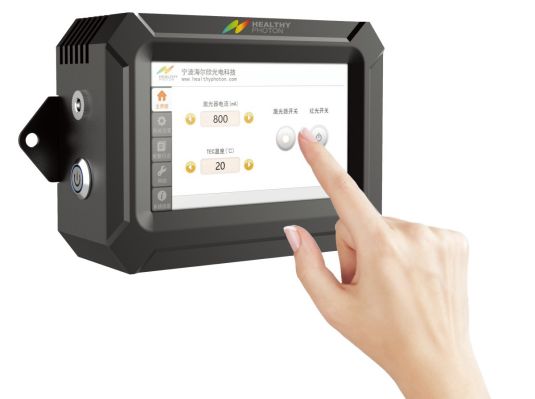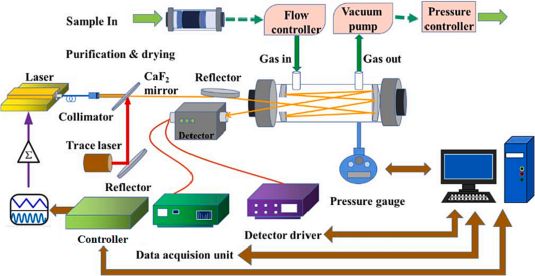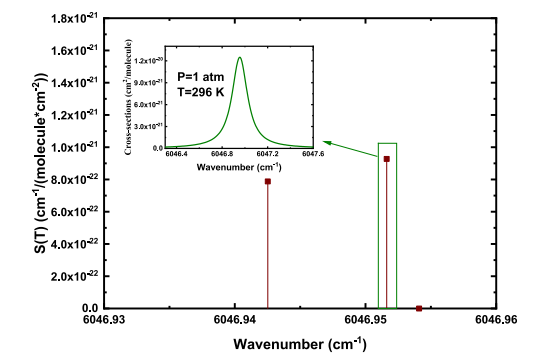近日,来自安徽大学的周胜副教授团队发表了《基于深度神经网络的无需压力校准和轮廓拟合的气体传感光谱技术》论文。
Recently, the research team from Associate Professor Zhou Sheng's from Anhui University published an academic papers Pressure calibration- and profile fitting-free spectroscopy technology based on deep neural network for gas sensing.
甲烷(CH4)是天然气的主要成分,在工业生产和日常生活中广泛用作燃料。此外,甲烷是一种重要的温室气体,其浓度对全球气候产生重要影响。因此,甲烷的测量对环境监测、生物医药和能源研究具有重要意义。气体浓度通常通过各种微量气体传感器进行测量,例如气相色谱仪、半导体气体传感器和电化学设备。半导体气体传感器在适当的操作环境下具有ppm级别的灵敏度。激光吸收光谱技术具有高选择性、高灵敏度、快速和多成分监测等优势,目前广泛用于各种气体的检测。激光吸收光谱技术可以准确测量气体分子的特征吸收线,并基于可调谐激光有效降低其他气体光谱线的干扰。此外,它提供了实时原位气体检测的可能性,这对于从工业过程到环境变化的各种现象的理解和监测至关重要。气体分子可以通过其指纹吸收光谱进行有效识别,包括典型的所谓“自展宽”参数和“空气展宽”参数。光谱线参数是压力和温度的函数。浓度测量的准确性取决于压力稳定性和光谱拟合精度。对于定量光谱分析,传统上通过准确的模型对光谱进行拟合,同时压力和温度必须定期校准,尤其是在相对大的环境波动情况下。因此,为实现所需的准确性,系统的复杂性增加了。
Methane (CH4), which is the main component of natural gas, is widely used as fuel in industrial production and daily life. In addition, CH4 is an important greenhouse gas whose concentration has a substantial influence on global climate. Therefore, the measurement of CH4 has significant importance for environmental monitoring, biomedicine, and energy research. The gas concentrations are commonly measured by various trace gas sensors, such as gas chromatographs, semiconductor gas sensors, and electrochemical devices. The semiconductor gas sensors have a sensitivity of ppm level under a suitable operating environment. The laser absorption spectroscopy, which has the advantages of high selectivity, high sensitivity, and fast and multi-component monitoring, is currently widely used in the detection of a variety of gases. Laser absorption spectroscopy technology can accurately measure the characteristic absorption lines of gas molecules and effectively reduce the interference of other gas spectral lines based on the tunable lasers. Moreover, it provides the possibility of real-time in-situ gas detection, which is crucial for understanding and monitoring a variety of phenomena from industrial processes to environmental change. A gas molecule can be effectively identified by its fingerprint absorption spectrum, including typical so-called “self-broadening” parameters and “air-broadening” parameters. The spectral line parameters are functions of pressure and temperature. The accuracy of concentration measurement depends on pressure stability and spectral fitting accuracy. For quantitative spectral analysis, the spectra are traditionally fitted by an accurate model, while the pressure and temperature must be calibrated on time, especially in the case of relatively large environmental fluctuations. Consequently, the complexity of system is increased to achieve the required accuracy.
目前,人工智能的快速发展为解决这个问题提供了一种新途径。人工神经网络已被用于气体识别,并在足够训练数据的条件下表现出良好性能。基于Hopfield自联想记忆算法的神经网络已用于识别五种类似的醇的红外光谱。反向传播神经网络用于从混合气体中识别目标气体,证明了卷积神经网络(CNN)模型可以有效提高识别准确性。此外,最近的研究表明深度神经网络也可以应用于振动光谱分析。卷积神经网络和自编码器网络被用于处理一维振动光谱数据。与传统气体检测技术相比,辅以深度学习的气体传感器可以实现准确的灵敏度测量,并降低异常检测的鲁棒性。深度神经网络(DNN)可以在经过足够样本训练后直接从吸收光谱中学习特征,实现不需要压力校准和轮廓拟合的气体浓度直接识别。这种网络为检索气体浓度提供了一种新途径,无需昂贵且复杂的压力控制器。为了展示提出的DNN辅助算法的性能,构建了一个基于DFB激光二极管的甲烷检测气体传感器系统。预测的浓度与校准值相当吻合。这项研究表明,基于DNN的激光吸收光谱在大气环境监测、呼气检测等方面具有显着潜力。
Currently, the rapid development of artificial intelligence provides a new way to solve this problem. The artificial neural network has been used for gas identification and shows a good performance under the condition of sufficient data for training. The infrared spectra of five similar alcohols has been identified by a neural network based on the Hopfield self-associative memory algorithm . A back propagation neural network is used to recognize target gas from the mixtures of gases, which proved that the convolutional neural networks (CNN) model can improve identification accuracy effectively. In addition, recent studies indicate that deep neural networks can also be applied to vibrational spectral analysis. The convolutional neural and auto encoder networks are used to process onedimensional vibrational spectroscopic data. Compared with traditional gas detection technology, the gas sensors assisted with deep learning can achieve accurate sensitivity measurement and reduce the robustness of anomaly detection.
A deep neural network (DNN), which can learn features directly from the absorption spectra after training with sufficient samples, achieves the direct identification of gas concentration free of pressure calibration and profile fitting. This network provides a new way to retrieve gas concentrations without expensive and complicated pressure controllers. To demonstrate the performance of proposed DNN assisted algorithm, a DFB diode laser-based gas sensor system for CH4 detection is constructed. The predicted concentrations are in good agreement with the calibrated values. This study indicates that DNN-based laser absorption spectroscopy has remarkable potential in atmospheric environmental monitoring, exhaled breath detection and etc..
实验装置
用于获取甲烷(CH4)气体吸收光谱的实验装置如图1所示。一台近红外DFB激光二极管,最大峰值输出功率为20毫瓦,被用作光源。通过控制激光温度和电流,激光可以在6045 cm-1到6047 cm-1范围内进行调谐,宁波海尔欣光电科技有限公司为此项目提供激光驱动器,型号为QC-1000。所选CH4在6046.95 cm-1附近的吸收线在图2中基于从HITRAN数据库获取的光谱线参数进行了模拟。DFB激光二极管经过纤维准直器进行准直,然后由一块CaF2分束器进行对准,分束后的可见红光(632.8纳米)光束用作跟踪激光。随后,光束被送入一个7米有效光程的多程传输池,并且池内的压力由压力控制器、流量控制器和隔膜泵协同控制。一个典型频率为100赫兹的三角波被用作扫描信号,以驱动激光二极管。最后,激光通过一个InGaAs光电探测器进行检测,并被数据采集单元卡获取。信号随后传输到计算机,并由自制的LabVIEW程序进行分析。
Experimental setup
The experimental setup used to obtain CH4 gas absorption spectra is depicted in Fig. 1. A near-infrared DFB diode laser with a maximum peak output power of 20 mW is used as the optical source. The laser can be
tuned from 6045 cm− 1 to 6047 cm− 1 by controlling the laser temperature and current via the controller (QC-1000, Healthy photon Co., Ltd.). The absorption line of selected CH4 near 6046.95 cm− 1 is simulated based on spectral line parameters obtained from the HITRAN database in Fig. 2. The DFB diode laser is collimated by a fiber collimator and aligned by a CaF2 beam splitter with a beam of visible red light (632.8 nm) as the tracking laser. Subsequently, the beam is sent to a multi-pass cell with a 7 m effective optical length, and the pressure inside the cell is collaborative controlled by a pressure controller, a flow controller, and a diaphragm pump. A triangular wave with a typical frequency of 100 Hz is used as a scanning signal to drive the diode laser. Finally, the laser is detected through an InGaAs photodetector and acquired by a data acquisition unit card. The signal is subsequently transmitted to the computer and analyzed by the homemade LabVIEW program.

QC-1000, Healthy photon Co., Ltd.

Fig. 1. Experimental device diagram.

Fig. 2. The spectral line intensities of CH4 in the tuning range of 6046.93–6046.96 cm− 1 and the cross-section of the selected line obtained from the HITRAN database.
结论
总体而言,本项目开发了基于DNN算法和激光吸收光谱的概念验证气体传感器,并设计了基于DFB激光二极管的甲烷检测传感器系统。此外,通过计算RMSE和训练时间评估了DNN算法的性能,并优化了DNN层、神经元数量和epochs等参数,以获取最佳参数。提出了改进的系统来分析和预测气体吸收光谱数据,在甲烷浓度预测方面表现出良好的准确性和稳定性。不同浓度的甲烷预测值与相应的理论值线性拟合,证明其在实际领域应用中具有巨大潜力,尤其适用于恶劣环境。
Conclusions
Overall, a proof-of-concept gas sensor based on the DNN algorithm and laser absorption spectroscopy is developed, and a CH4 detection sensor system based on the DFB diode laser is designed in this paper. In addition, the performance of the DNN algorithm is evaluated by calculating RMSE and training times, and the parameters, which include DNN layers, neuron number, and epochs, are optimized to obtain optimal parameters. The modified system is proposed to analyze and predict the gas absorption spectrum data, demonstrating good accuracy and stability in the prediction of CH4 concentrations. The predicted values of methane with different concentrations are linearly fitted with the corresponding theoretical value, which proves it has great potential in practical field applications, especially for harsh environments.
参考References
Pressure calibration- and profile fitting-free spectroscopy technology based on deep neural network for gas sensing, Measurement 204 (2022) 112077
https://doi.org/10.1016/j.measurement.2022.112077